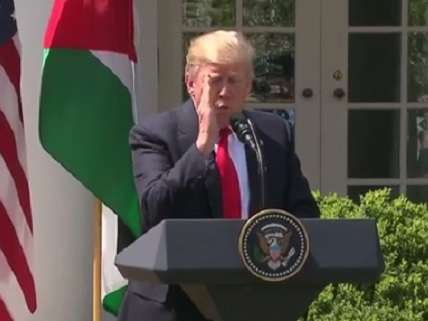Trump Says Syria Sarin Attack 'Unacceptable' to Him, Attitude Toward Assad 'Changed Very Much'
Trump said he was "flexible" on world affairs-the public tends to be less skeptical of interventionism in the wake of chemical attacks, too.

President Trump addressed yesterday's alleged Syrian sarin attack, calling it an "attack on children" that "had a big impact" on him in a joint press conference with the king of Jordan. "It was a horrible, horrible thing, and I've been watching it and seeing it and it doesn't get any worse than that," Trump continued, saying the attack had changed his attitude toward Syria and President Bashar Assad.
"I like to think of myself as a very flexible person, I don't have to have one specific way, and if the world changes, I go the same way, I don't change—well I do change, and I am flexible, and I'm proud of that flexibility," Trump explained.
An apparent attack with a chemical agent, likely nerve gas, yesterday, which reportedly killed at least 70 people, including more than 20 children, was the deadliest chemical attack in Syria since 2013, when hundreds were killed. Back then the U.S. and the West briefly flirted with a military intervention before an off-handed remark by then-Secretary of State John Kerry opened the door for Russia to offer to broker a voluntary chemical weapons disarmament by Syria. That year the Organization for the Prohibition of Chemical Weapons, which helped facilitate the disarmament, won a Nobel Peace Prize. Yesterday, White House Press Secretary Sean Spicer said the gas attacks were a "consequence of the past administration's weakness and irresolution."
Trump's pivot on potential intervention in Syria aimed at Assad (as opposed to the ongoing intervention aimed at ISIS) is emblematic of the public's attitudes too—the use of chemical weapons tends to increase support for military intervention. That pretty intuitive influence led some to question whether the Syrian regime, perceived to be on the verge of victory over rebels, would use such weapons. Russia, Syria's strongest allies, claims the Syrian warplanes hit an arms depot in a rebel-held area that included chemical weapons. A military expert told BBC the claim was "completely unsustainable and completely untrue."
While today's comments are the sharpest against Assad the president himself has made, his administration has more or less continued the Obama-era policy of objecting to Assad's rule but accepting the reality that he is firmly in control. A few days ago, Secretary of State Rex Tillerson said Assad's "long-term status" would be up to the people of Syria. That should be an uncontroversial, basic articulation of the principle of self-determination, yet today Sen. Marco Rubio (R-Fla.) said he did not think it was a "coincidence" that the gas attack came days after Tillerson's statement.
"In this case now, we have very limited options," Rubio admitted, though that admission rarely causes interventionists pause, "and look, it's concerning that the secretary of state said that the future's up to the people in Syria on what happens with Assad." Who else should it be up to? Certainly not Washington. And neither should Moscow's role in thwarting self-determination be an impetus for the U.S., too, to interfere.
The United Nations Security Council is meeting to discuss a response to the attacks, although Russia's veto power in the body precludes any kind of resolution like the one that provided cover for the U.S.-backed intervention in Libya in 2011. Nevertheless, U.S. Ambassador to the UN Nikki Haley warned the council that if it did not do something, the U.S. could act unilaterally. Such a move risks further destabilizing the Middle East and complicating U.S. quagmires across the region, with little if any substantive benefit. Over the last seven years of civil war in Syria, it has become less and less likely that whatever fills the vacuum created by Assad's removal would be any less brutal than the current regime.
It's hard, too, not to wonder whether months of incessant Trump-Russia rumormongering in Washington has pushed the Trump administration to taking a more provocative stance vis a vis Russia, as the Obama administration did for years to disastrous effect, shutting down any possibility of cooperation on counterterrorism efforts in favor of treating Russia like yet another nemesis to justify even more interventions in the Middle East.


Show Comments (33)